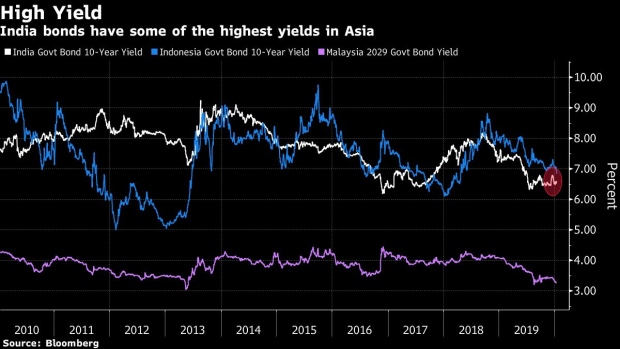Jan 14, 2020
Modi Reform Doubts Prompt Western Asset to Trim Bond Holdings
, Bloomberg News

(Bloomberg) -- Western Asset Management Co. is reducing its Indian government bond holdings as tensions around a new citizenship law and the Kashmir region cloud the economic outlook.
The $453 billion investor, an affiliate of Legg Mason Inc., is diverting some of its funds into longer-dated Malaysian and Chinese debt, according to Desmond Soon, head of investment management for Asia ex-Japan. It has an overweight position in India bonds.
The initial market euphoria from Prime Minister Narendra Modi’s re-election last year is wearing thin as economic growth stutters and a policy making it harder for Muslim migrants to get citizenship stirs protests. Foreign holdings of Indian sovereign debt have dropped to near a three-month low.
“It certainly distracts Prime Minister Modi’s government from making the necessary economic policy and reform to focus on the economy,” Soon, a 30-year investment veteran, said in Singapore. “We are in the process of reducing India somewhat.”
Angry protests have erupted in many Indian states, forcing the government to send in hundreds of soldiers to aid local police. Modi also stoked tension in Kashmir, the nation’s only Muslim-majority state, when he ended seven decades of autonomy for the area in 2019.
The changes, part of the election promises made by Modi’s Hindu nationalist government, have created mistrust among Muslims, who form about 14% of the population.
Read More: Why India’s Students Are Angry, Its Muslims Worried: QuickTake
Despite five interest-rate cuts last year to shore up growth, yields on 10-year India bonds remain some of the highest in Asia at 6.66%.
A recent rally in the market, spurred by bond purchases from the Reserve Bank of India, has stalled as inflation surges to a five-year high. Stagflation looms as the economy grinds toward its slowest expansion in more than a decade.
Malaysia Switch
Western Asset is buying Malaysian debt as the oil exporter will benefit medium term from higher energy prices, Soon said.
Gobal investors may also pour another $150 billion to $200 billion into Chinese bonds as the debt is gradually included in global benchmarks, he said.
Other Investment Views
- Dollar bond sales from companies in Asia, excluding Japan, to exceed last year’s issuance in 2020 -- driven by Chinese companies seeking debt to grow
- Fund is overweight Indonesian and Philippines local currency bonds
- Asian countries appear poised to embark on fiscal easing, including Korea, Singapore, Hong Kong and Taiwan
--With assistance from Chester Yung.
To contact the reporters on this story: Ruth Carson in Singapore at rliew6@bloomberg.net;Ameya Karve in Singapore at akarve@bloomberg.net
To contact the editors responsible for this story: Tan Hwee Ann at hatan@bloomberg.net, Cormac Mullen
©2020 Bloomberg L.P.


